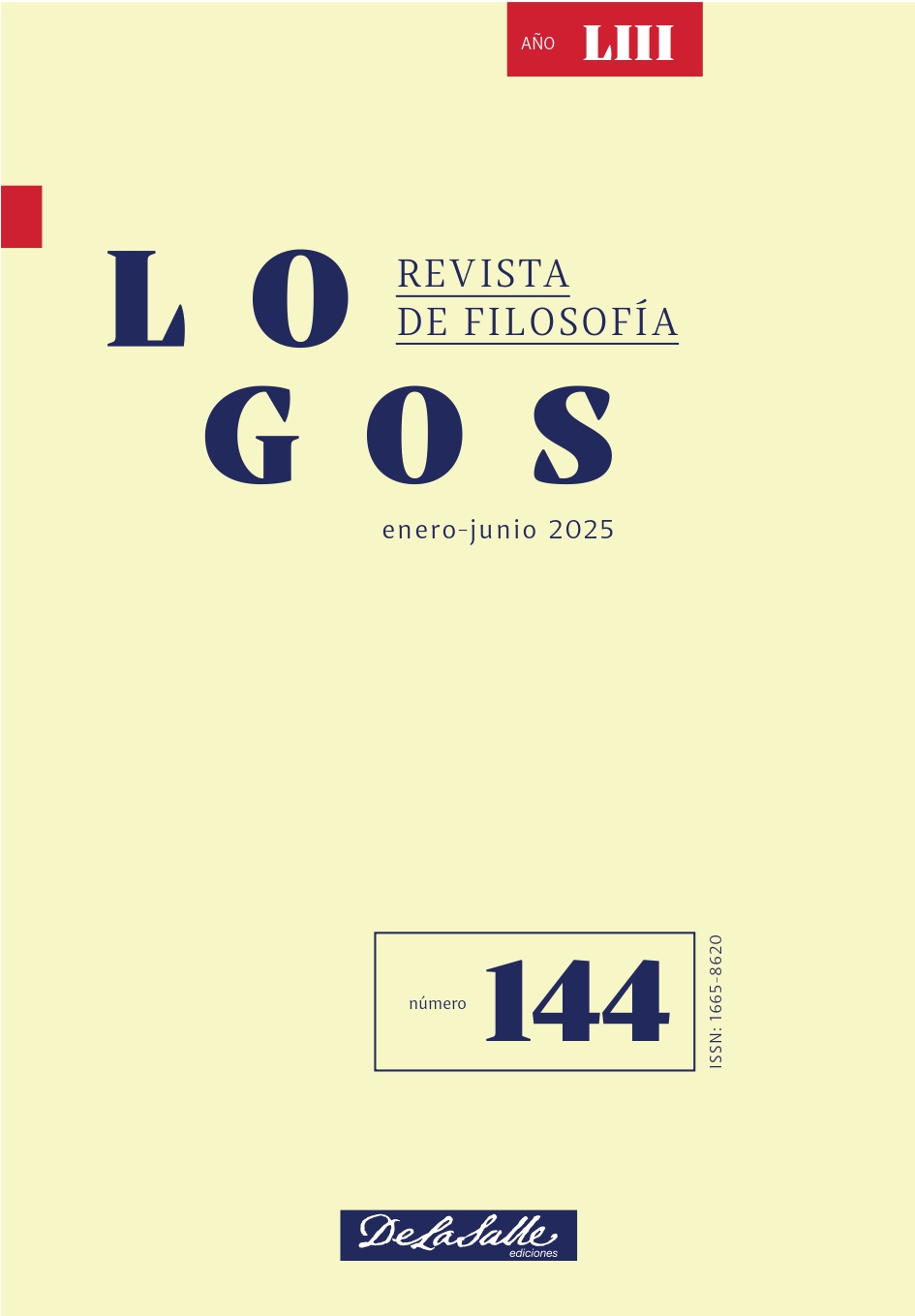Habitation of Metaphor: Nietzsche as apprentice (of the error) of Jesus
DOI:
https://doi.org/10.26457/lrf.v144i144.4478Keywords:
Nietzsche, Jesús, lenguaje, vida, metáforaAbstract
In this paper, Nietzsche's reading of Jesus will be articulated with the capacity that Nietzsche's language presents when expressing his ideas, taking one of them, central to his perspective: the notion of life. From this, the objective will be to show how, from the specific result of the 'misunderstanding' that Paul makes of the message of Jesus, Nietzsche obtains a fundamental teaching in linguistic terms, from which the relationship between language and the concept of the life of the post-Zarathustra work unfolds.
Downloads
References
Acampora, Christa. “Nietzsche contra Homer, Socrates, and Paul”. Journal of Nietzsche Studies, n.o 24 (2002): 25-53. https://www.jstor.org/stable/20717790
Alvarez, Maria y Aaron Ridley. “Nietzsche on language: Before and after Wittgenstein”. Philosophical Topics 33, n.o 2 (2005): 1-17. https://www.jstor.org/stable/43154724
Assoun, Paul-Laurent. Freud et Nietzsche. París: Presses Universitaires de France, 2008.
Bacarlett Pérez, María. Friedrich Nietzsche: La vida, el cuerpo y la enfermedad. Toluca: Universidad Autónoma del Estado de México, 2006. http://ri.uaemex.mx/bitstream/handle/20.500.11799/32771/cuerpoyenfermedad.pdf?sequence=1&isAllowed=y
Belliotti, Raymond. Jesus or Nietzsche: How should we live our lives? Amsterdam: Rodopi, 2013.
Ben-Zvi, Omri. “Becoming and perspectivism in Nietzsche’s thought”. Iyyun: The Jerusalem Philosophical Quarterly, n.o 65 (2016): 237-262. https://www.jstor.org/stable/24904679
Cacciari, Massimo. Le Jésus de Nietzsche. Paris: Éditions de l'Éclat, 2011.
Davis, Bret W. “Zen after Zarathustra: The problem of the will in the confrontation between Nietzsche and buddhism”. Journal of Nietzsche Studies, n.o 28 (2004): 89-138. https://www.jstor.org/stable/20717843
Emden, Christian. Nietzsche on language, consciousness, and the body. Illinois: University of Illinois Press, 2005.
Gemes, Ken. “Nietzsche’s critique of truth”. Philosophy and Phenomenological Research 52, n.o 1 (1992): 47-75. https://doi.org/10.2307/2107743
Lucero, Guadalupe. “Música insignificante: Avatares de la insistencia musical en la crítica nietzscheana del lenguaje”. Instantes y Azares: Escrituras Nietzscheanas, n.o 4-5 (2007): 67-82. https://dialnet.unirioja.es/servlet/articulo?codigo=3267028
Marton, Scarlett. “Le problème du langage chez Nietzsche: La critique en tant que création”. Revue de Métaphysique et de Morale 2, n.o 74 (2012): 225-245. https://shs.cairn.info/revue-de-metaphysique-et-de-morale-2012-2-page-225?lang=fr
Martel, James. “Nietzsche’s cruel messiah”. Qui Parle 20, n.o 2 (2012): 199-223.
Niemeyer, Christian. Diccionario Nietzsche: Conceptos, obras, influencias y lugares. Madrid: Siglo XXI, 2012.
Nietzsche, Friedrich. Así habló Zaratustra. Madrid: Alianza, 2007.
— Aurora: Reflexiones sobre la moral como prejuicio. Barcelona: Alba, 1999.
— Digital critical edition of the complete works and letters. Editado por Paolo D’Iorio. París: Nietzsche Source, 2009. http://www.nietzschesource.org/#eKGWB
— Ecce homo. Madrid: Alianza, 1979.
— El Anticristo. Madrid: Alianza, 2017.
— El nacimiento de la tragedia. Madrid: Alianza, 2007.
— Genealogía de la moral. Madrid: Alianza, 2000.
— Humano, demasiado humano. Madrid: Akal, 2007.
— La gaya ciencia. Madrid: Alianza, 2001.
— Más allá del bien y del mal. Madrid: Alianza, 2007.
— Sobre verdad y mentira en sentido extramoral. Madrid: Península, 2003.
O’Hara, Daniel T. “Parables of the anonymous God in Nietzsche and Foucault”. Symplokē 26, n.o 1-2 (2018): 427-434.
Rawat, Khalid Jamil. “Language and truth: A study of Nietzsche’s theory of language”. Annales Philosophici, n.o 6 (2013): 39-46.
Reginster, Bernard. The affirmation of life: Nietzsche on overcoming nihilism. Cambridge: Harvard University Press, 2006.
Remhof, Justin. “Overcoming the conflict of evolutionary and naturalized epistemology in Nietzsche”. History of Philosophy Quarterly 32, n.o 2 (2015): 181-194.
Rivas, Ricardo Marcelino. “Metáfora y mentira: Aproximación al concepto de cultura en Nietzsche”. Intersticios 12, n.o 29 (2008): 17-30. https://www.academia.edu/1946667/MET%C3%81FORA_Y_MENTIRA_APROXIMACI%C3%93N_AL_CONCEPTO_DE_CULTURA_EN_NIETZSCHE
Roberson, Michael. “Nietzsche’s poet-philosopher: Toward a poetics of response-ability, possibility, and the future”. Mosaic: An Interdisciplinary Critical Journal 45, n.o 1 (2012): 187-202.
Safranski, Rüdiger. Nietzsche. Biografía de su pensamiento. Barcelona Tusquets, 2001.
Santaniello, Weaver. “Nietzsche’s ‘Antichrist’ vs. antisemitism and Ernest Renan”. Iyyun: The Jerusalem Philosophical Quarterly, n.o 64 (2015): 295-312. https://www.jstor.org/stable/24523471
Stiegler, Barbara. “¿Qué cambia poner el cuerpo en el lugar del alma?: Nietzsche entre Descartes, Kant y la biología”. Eidos: Revista de Filosofía de la Universidad del Norte, n.o 1 (2003): 128-141. https://www.redalyc.org/articulo.oa?id=85400108
— Nietzsche et la biologie. París: Presses Universitaires de France, 2001.
Van Tongeren, Paul, Gerd Schank y Nietzsche Research Group. “Hors D'oeuvre: Nietzsche's language and use of language”. Journal of Nietzsche Studies, n.o 22 (2001): 5-16. https://www.jstor.org/stable/20717764
Strong, Tracy B. “Language and nihilism: Nietzsche's critique of epistemology’. Theory and Society 3, n.o 2 (1976): 239-263. https://www.jstor.org/stable/656848
— “In defense of rhetoric: Or how hard it is to take a writer seriously; The case of Nietzsche”. Political Theory 41, n.o 4 (2013): 507-532. https://doi.org/10.1177/009059171348839
Steineger, James. ‘Friedrich Nietzsche and Sigmund Freud failure: A tomist protest on truth’. Quodlibet Diary 6, n.o 1(2004): 55-73.
Vattimo, Gianni. Diálogo con Nietzsche. Barcelona: Paidós, 2002.
Vioulac, Jean. “Nietzsche et Pascal: Le crépuscule nihiliste et la question du divin”. Les Études Philosophiques, n.o 1 (2011): 19-39.
Yadin, Azzan. “A web of chaos: Bialik and Nietzsche on language, truth, and the death of God”. Prooftexts 21, n.o 2 (2001): 179-203. https://doi.org/10.2979/pft.2001.21.2.179
Downloads
Published
Versions
- 2025-11-17 (3)
- 2025-04-04 (2)
- 2025-04-01 (1)


